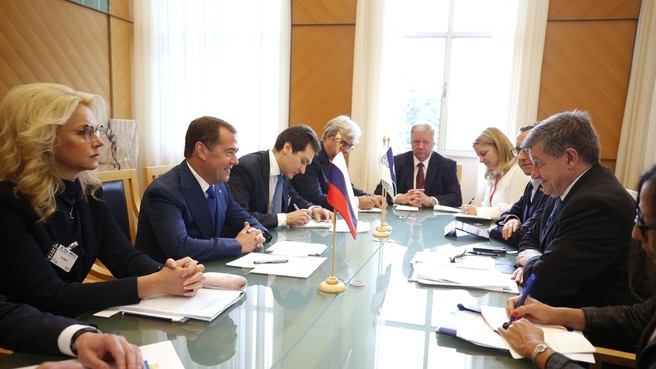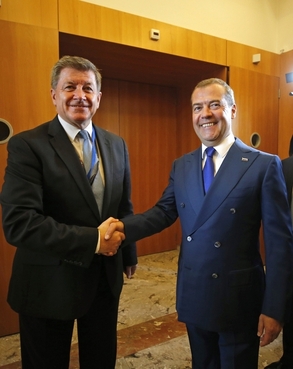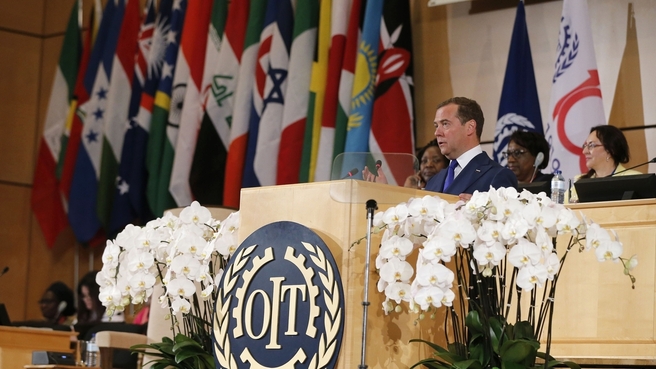The 108th session is dedicated to the centenary of the International Labour Organisation.
Dmitry Medvedev meets with Director-General
of the International Labour Organisation Guy Ryder ahead of the plenary meeting.
Dmitry Medvedev’s remarks at the plenary meeting:
Mr Ryder, ladies and gentlemen. On behalf of the Russian Federation, I am glad to greet all participants of the 108th session of the International Labour Conference that is taking place on the 100th anniversary of the International Labour Organisation.
The ILO is one of the oldest and, undoubtedly, most reputable international organisations. Since its establishment in 1919, the organisation has been consistently defending workers’ interests, their right to decent working conditions, workplace safety and social protection. The national labour laws of many countries are based on ILO conventions. Of course, Russia is no exception.
Today, stepping into a new century, the ILO is once again raising important and relevant questions about the future of labour relations. It is encouraging us to look for answers together, relying on the vast experience of successful and non-politicised cooperation as well as on the extensive practice of mutual consideration for each other’s interests.
The most valuable quality of this organisation is its unique format. Unlike at many other platforms, countries do not argue with each other here but build cooperation in the triangle of trade unions, employers and governments. Tri-partisanship as an equal system of regulation came into being and was developed throughout the entire 20th century. It helped to solve the most acute socioeconomic problems of the ILO member states. The establishment of the Trilateral Commission on the Regulation of Social and Labour Relations was one of the first legislative decisions of the new Russia. This mechanism helped us to get through both the difficult 1990s and the economic crises that happened in this century.
But in modern circumstances, the format of tri-partisanship also requires certain adjustments, a new and calibrated balance, which is the focus of the ILO’s efforts. Today’s agenda centres on workers’ rights and interests rather than the demands of corporations or states. It centres on people’s career expectations, if you like. Recognising people, their lives and wellbeing as the ultimate goal of modern development sets completely new parameters for corporate and government policies. It is an important historical process and a challenge to which we need to find an adequate response together.
New approaches are necessary to working time and study arrangements. First of all, people must have an opportunity to study throughout their careers. This idea was stressed in the ILO Global Commission report “Work for a brighter future,” the key statements from which will be included in the final document of this session, the Centenary Declaration.
Training, retraining and acquiring interdisciplinary and completely new knowledge and skills allow one person to live several professional lives, something previously unheard of, to become a recognised expert in a number of areas, and, most importantly, to always remain sought-after by employers. After all, technology is already changing many jobs. Old professions become obsolete while new ones emerge. For instance, experts predict (and this information is widely known) that in several years, almost two million driverless vehicles will be sold annually, and in another five years, the sales will exceed 10 million. One of the reasons is a reduction in value and, if the trend continues, we will have to understand what will happen to cab and lorry drivers. These are tricky processes that will affect almost all countries. It is unlikely that the newly available workforce will be taken in by new massive production facilities. These facilities may be big, but chances are they will have very few workers. These are the technological changes that we absolutely must take into account when developing recommendations.
Second of all, not only the nature of work but its formats are changing. Yesterday I had a fascinating visit to the European Organisation for Nuclear Research. CERN is a self-sufficient town where you can work and live without having to ever go elsewhere.
These research centres are not the only places where boundaries between professional and personal lives disappear.
As technology develops, for many people their own home is becoming a workplace. I am talking about increasingly popular remote and part-time employment. It is a mass phenomenon now involving an entire social group, freelancers. This kind of employment transcends state borders and national labour markets. Digital technology provides almost unlimited opportunities for work and self-actualisation regardless of gender, age, social status and place of residence. This is the new paradigm of labour, and it is a promising incentive for talented people, especially those who live in developing countries.
With this in mind, employers will have to more carefully consider their workers’ interests. Technological progress is not only reducing the number of jobs but also the working hours, thus expanding leisure time. It may well be that the future lies with a four-day workweek as a standard for social-labour contracts. Let me remind you that one hundred years ago, Henry Ford took a chance and cut the workweek from 48 to 40 hours, which resulted in an impressive growth of productivity.
There are more recent examples. A company in New Zealand introduced a four-day workweek. The third day-off is paid like the other two. As a result, productivity per working hour increased by around 20 percent. Employees’ stress levels decreased significantly.
Clearly, these are very complex and not fully elaborated ideas that will continue to be a subject of serious discussions. At the same time, it is a very important indicator. In constant pursuit of success, people suffer from chronic tiredness and stress, and often simply burn out at work. This brings lower productivity which, in turn, affects economic indicators. Two weeks ago, the World Health Assembly here, in Geneva, officially recognised a burnout syndrome as a medical condition.
We need new approaches to such basic concepts as the work day and the workplace. Working hours can be organised more leniently, with flexible schedules and remote work so that employees have to be in the office only when necessary.
Also, as life becomes more comfortable thanks to new technology, so should human resources and office management. Labour relations need far less
bureaucracy, and the International Labour Organisations (ILO) focuses on that.
In this respect, small and medium-sized businesses are a major response to massive social requirements. To avoid basic dissatisfaction (and there were many examples of this in the 20th century), business has to adapt to new generations of workers. Incentive systems that used to inspire previous generations, are oftentimes totally ineffective with the current generation.
Apparently, our children are going to be wiser than we were. Confucius’s words sound like practical advice across the centuries rather than a routine saying, “Choose a job you like and you will never have to work a day in your life.” Of course, nobody should take this maxim literally.
For its part, the state as an institution, is also looking for answers to the needs of today’s young people. I will tell you about Russia’s approaches. Last year we launched 12 national programmes, a major infrastructure upgrade plan. In essence, they are a large-scale investment in people and their development. We focused huge financial resources to gain significant progress in raising the wellbeing and standard of living of the Russian people in the coming six years. We have special national programmes that are committed, among other things, to labour productivity and employment support.
We are transforming entire areas and institutions to fit people’s needs, adjusting the tax system and establishing special tax considerations for this.
And the key here is, of course, mutual trust between a worker, an employer and the state rather than fiscal issues, since it is important to not just collect taxes but also to introduce millions of people to legal labour on conditions which are transparent and attractive to them. This issue also needs to be resolved in our country.
All countries are encountering changes in the labour market. We live in a globalised world. Labour relations regulations need certain general approaches and principles. Yet such matters as illegitimate sanctions, protectionism, trade wars, and other artificial barriers have a negative impact on the labour market and the countries’ economies in general. Companies and organisations, and consequently, people find it increasingly hard to live outside politics, something that is impossible to call a positive development.
Some countries’ behaviour in trade and the economy is becoming ever more aggressive virtually bordering on lawlessness…
The world order that has been in place for decades is being threatened. Let me remind you that we are in the building which used to host the League of the Nations headquarters. Its grim fate is a reminder to us of how fragile the international relations architecture is and how important it is to support it in every possible way. Russia is against any new “Berlin wall,” we adhere to the principles of openness, respect for national interests and mutually beneficial cooperation. These are the principles we used for establishing the Eurasian Economic Union.
Ladies and gentlemen, I think you will agree with me that the world picture is being painted anew today. As a representative of a nation that survived one of the most radical revolutions in world history, I would like to convey the following. We know from experience about the need to respond in a timely and professional manner to social change, to the need for new requirements in society and to workers’ needs. If these challenges are ignored, it always leads to sad consequences not only for individual states but also for the world economy and the overall global system of relations.
Social unrest regularly breaks out in different parts of the world causing a powerful social resonance, whereas the growth of radical, populist political forces in Europe in the past decade is nothing but an expression of people’s dissatisfaction with declining living standards and the destruction of a traditional way of life under the impact of diverse circumstances. The key is the consequence of dissatisfaction with government activity, which, according to many people, are somewhat failing to deal with new political and economic challenges, including migration issues which looks increasing more like the great Migration Period.
The ILO’s recommendations and conventions are especially timely in this context. They are universal and present a comprehensive code for the best practices of regulating social and labour issues. Of particular interest is the ILO’s recommendation on introducing a comprehensive labour guarantee which must be given to all workers. This guarantee is fundamentally significant from the point of view of protecting workers’ rights. I am confident that it can be implemented even though it presents a very ambitious challenge in itself. Many guarantees like this have long been adopted in Russia, some of them are even included in the Constitution, and we must encourage all countries to take the step of introducing a universal labour guarantee.
We attach great importance to practical cooperation with the International Labour Organisation and take its standards as paragons in such crucial fields as social insurance and retirement. I am very happy to note that the Russian Federation has ratified 77 ILO conventions and two protocols. It is also to our country’s benefit to apply the organisation’s experience in the official employment policy under an economic crisis (this specially concerns young people), fighting poverty and labour migration. This has all been reflected in the 2017-2020 Cooperation Programme between the Russian Federation and the International Labour Organisation. We fully share the organisation’s mission and tasks as they are presented in the founding documents. And we support the stance of the ILO that our common challenge in the 21st century is to turn labour into a universal factor of personal development, a source of unveiling and fulfilling the potential of all people.
I sincerely wish conference attendees interesting and constructive work, and I wish success to the International Labour Organisation which is entering its second century.












